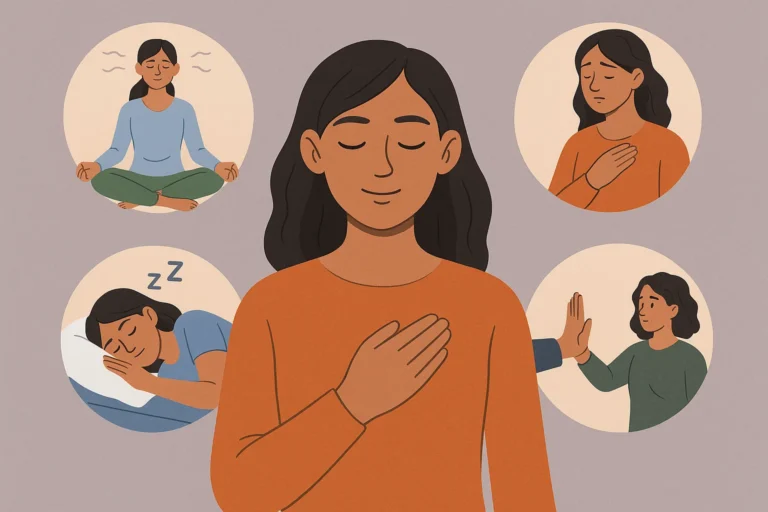Introduction:
In today’s fast-paced world, many people — especially women — are juggling responsibilities without ever pausing to care for themselves. This lack of self-nurturing leads to burnout, anxiety, and poor mental health. The good news? Self care doesn’t have to be time-consuming or complicated.
So what are some simple yet powerful self care activities that can truly make a difference?
This article explores 10 super easy self care practices backed by real science — designed to support mental, emotional, and spiritual health without overwhelming your schedule.
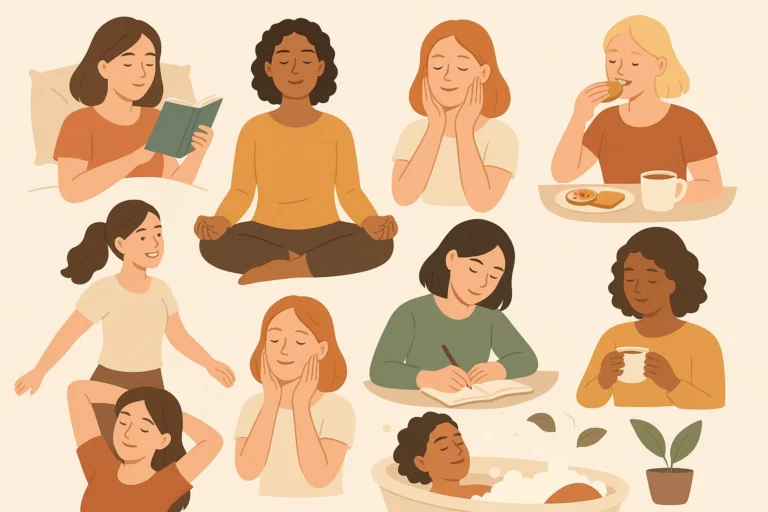
Why Self Care is Crucial for Mental Health
Self care isn’t indulgence — it’s essential. The brain and body thrive on rest, reflection, and nourishment. When we ignore our basic needs for emotional support, sleep, or alone time, the result is often stress overload.
According to the American Psychological Association, over 70% of adults report experiencing physical or emotional symptoms due to stress. One of the best ways to take care of your mental health is through intentional, regular self care.
Benefits of Self Care:
- Supports better mental health by lowering anxiety and depression
- Improves emotional regulation and clarity
- Boosts physical energy and sleep quality
- Encourages healthy boundaries and self-awareness
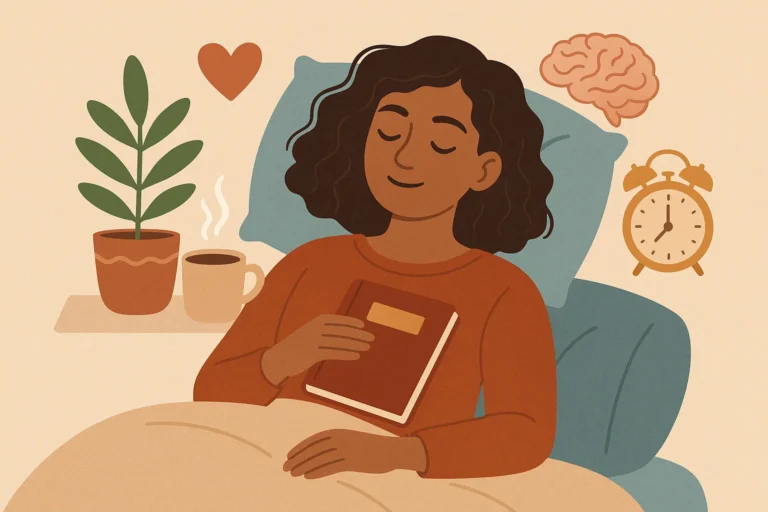
10 Super Easy Self Care Activities (Backed by Science)
Here are 10 simple self care actions you can do today to start feeling better without needing hours of free time or fancy tools.
- Morning Silence & Mindful Breathing (5 minutes)
Even just 5 minutes of deep breathing or sitting quietly in the morning helps reduce cortisol levels and starts the day with a calm mindset.
- Drink a Glass of Water Before Coffee
Hydration first thing in the morning improves cognitive performance and supports digestion — key for mood regulation.
- Take a 15-Minute Walk in Nature
Nature therapy has been shown to improve mental health by calming the nervous system and boosting serotonin.
- Declutter One Small Space
Organizing your space reduces visual stress and increases dopamine, giving you a quick sense of accomplishment.
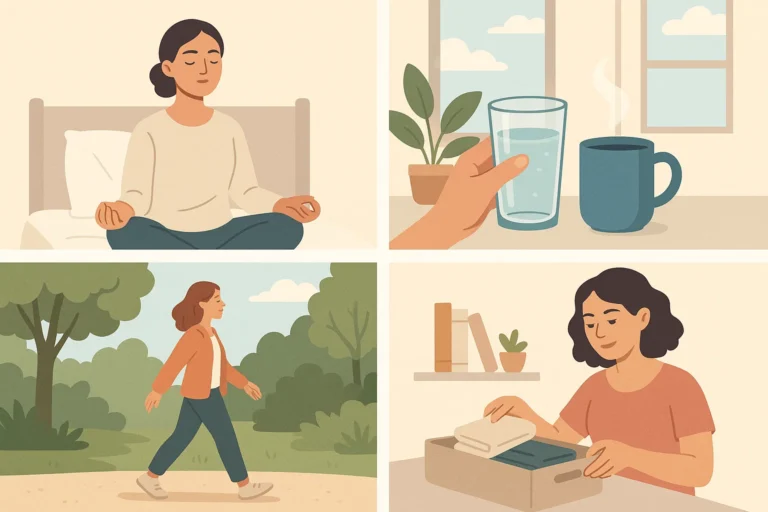
- Listen to Music That Elevates You
Music has a direct impact on brainwaves. Listening to calming or joyful music reduces anxiety and lifts your mood in minutes.
- Digital Detox for 1 Hour a Day
Reducing screen time — especially social media — significantly supports good mental health and improves focus.
- Write a 3-Sentence Gratitude Journal
Journaling increases positivity, trains the brain to focus on the good, and builds long-term resilience.
- Practice Saying No (Respectfully)
Learning to say no helps set boundaries and protects emotional energy. According to Psychology Today, boundary-setting reduces resentment and builds confidence.
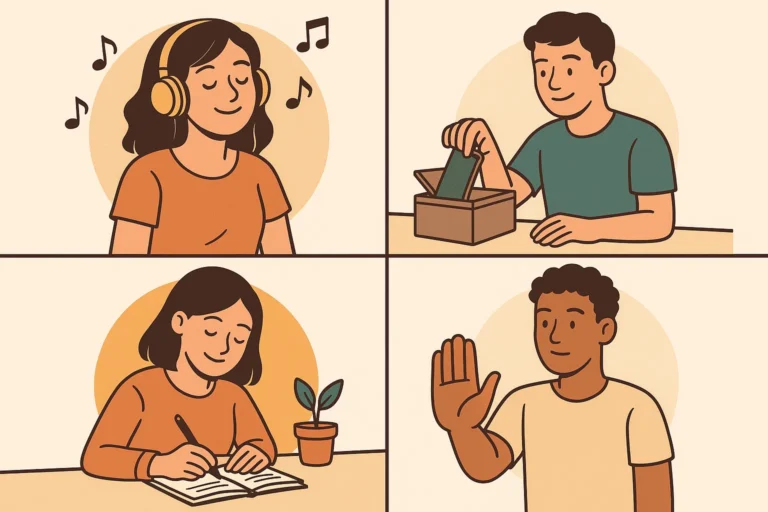
- Take a Warm Shower and Use Aromatherapy
Scented oils like lavender or eucalyptus reduce muscle tension and signal the brain to relax.
- Read or Listen to Something Inspiring Before Bed
Feeding your mind with nourishing content improves your mindset and encourages better sleep quality.

Inner Child and Emotional Healing
Many mental health blocks are rooted in ignored emotional needs from childhood. Nurturing your inner child through self care is one of the most powerful paths to long-term healing.
How to Practice Inner Child Work:
- Write a letter to your younger self
- Do an activity you loved as a kid (coloring, dancing, baking)
- Speak kindly to yourself when emotions surface
A 2020 study in Journal of Clinical Psychology emphasized that reparenting techniques reduce shame and improve self-acceptance.
Self care isn’t always bubbling baths. Sometimes it’s healing old wounds with love and compassion.

Spiritual Health & Holistic Healing Practices
Self care should also nourish the soul. Spiritual health doesn’t have to be religious — it can be any practice that brings meaning, peace, or deeper connection to life.
Examples of Spiritual Self Care:
- Meditation or Prayer (even 5 minutes)
- Reading spiritual or motivational books
- Spending time in nature mindfully
- Creative rituals like journaling, sound healing, or breathwork

Holistic healing connects mind, body, and spirit. Practices like Reiki, breathwork, or energy clearing can bring powerful emotional release.
According to a 2022 Cleveland Clinic report, holistic therapies are increasingly being used alongside clinical mental health treatment to reduce stress and improve resilience.
How to Build a Weekly Self Care Routine That Lasts
It’s easy to start strong and give up within a week. The key to lasting self care is consistency over intensity. Here’s a framework anyone can follow.
Weekly Self Care Planner:
Day | Self Care Idea |
Monday | 10-minute walk + gratitude journal |
Tuesday | Digital detox + inspiring podcast |
Wednesday | Nature walk + declutter a drawer |
Thursday | Say no to something draining |
Friday | DIY facial + scented shower |
Saturday | Creative hobby + connect with a friend |
Sunday | Reflect, plan, and spiritual reading |
Make self care non-negotiable by scheduling it into your calendar like any important task. Start with just 1–2 of these activities and build from there.
“Self care isn’t a trend; it’s a survival strategy.” — Mental Health Foundation
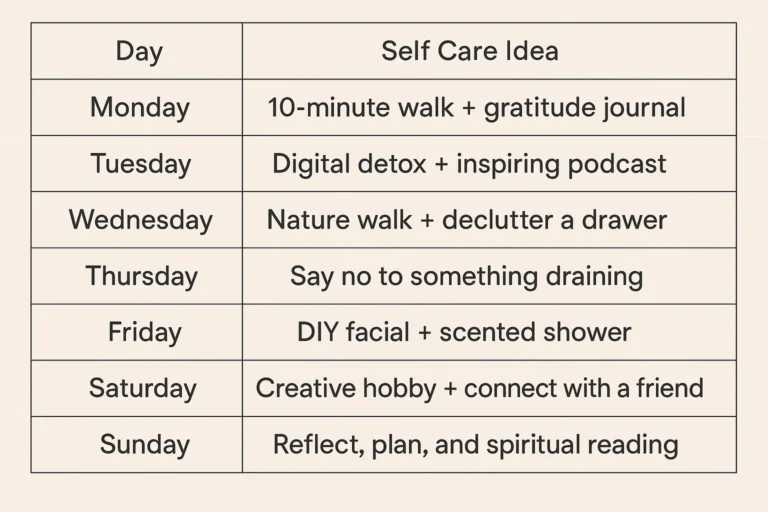
Conclusion: You Deserve to Feel Better
Self care isn’t about doing more — it’s about doing what matters. These 10 super easy self care ideas are rooted in science and compassion, helping you reclaim your peace without pressure. Start small, stay consistent, and remember: showing up for yourself every day is the most loving act you can offer.
